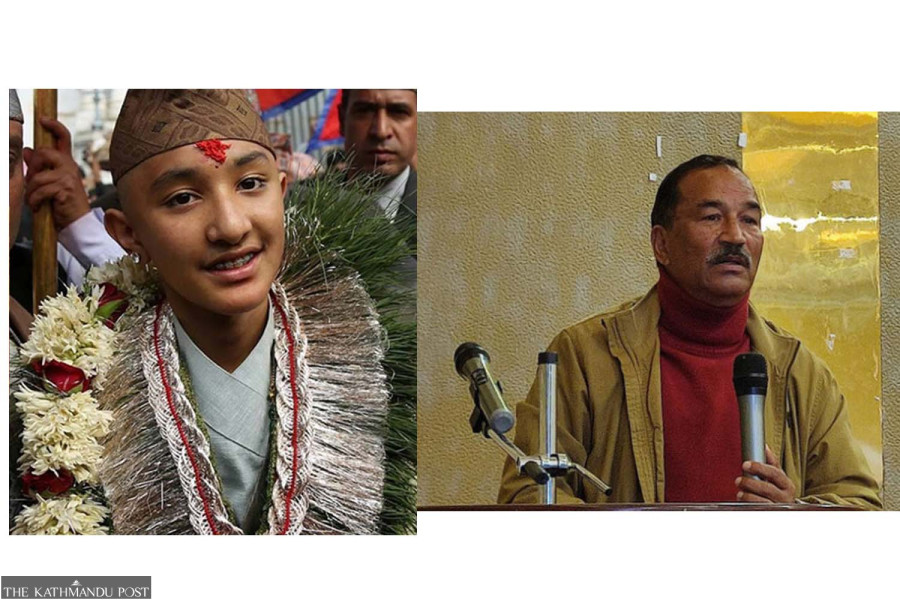Politics
RPP says protest will be peaceful, and within Ring Road
Hridayendra Shah may be king if monarchy is reinstated, RPP-Nepal chair Kamal Thapa suggests.
Post Report
Rastriya Prajatantra Party Chairman Rajendra Lingden has said street protests and demonstrations that the pro-monarchy outfit is staging in the Capital from May 29 will be peaceful.
Their agitation for the goal of reinstating the monarchy will focus on civil disobedience and Satyagraha (non-violent resistance), he added. Their activities will be held in the Ratnapark area of Kathmandu, and not outside of the Ring Road.
Speaking to journalists on Tuesday to inform them about the planned protest and demonstration for the restoration of monarchy and the Hindu state, Lingden said the event will be held at Ratnapark even if the administration does not permit them. He also objected to the CPN-UML's plan to hold a mass meeting nearby the same day, suggesting it was an attempt to create a clash.
"Our protest will not be violent. It will be completely under our control, and won’t be held outside the Ring Road. Even if the administration denies permission, we will hold it at Ratnapark," Lingden said.
Justifying the need for “public pressure”, he stressed that the change in the political system is not possible through elections alone.
Lingden has accused Prime Minister KP Sharma Oli of attempting to incite disruption of his party’s protest programme.
“The prime minister is trying to provoke unrest on Jestha 15 [Thursday]. Prime Minister Oli made such an inappropriate statement that he either has to correct it or he should resign,” Lingden said.
Speaking at a CPN-UML function, Oli, who also chairs the party, warned that from 11 am to 2 pm on May 29, Kathmandu should be under the control of his ruling party.
Lingden accused the government of trying to suppress the freedom guaranteed by the constitution. “We announced a programme at Ratnapark, and the prime minister’s party is summoning its cadres nearby to create a clash. Journalists need to report on this matter impartially,” Lingden pleaded.
A loose alliance of pro-royalist and pro-Hindu groups, who are demanding the restoration of the Hindu state and monarchy, have come together for a joint protest. Riled by their plan, Oli has instructed UML cadres to gear up to take Kathmandu streets under their control.
Kamal Thapa, chairman of the Rastriya Prajatantra Party Nepal (RPP-N), announced that the time had come for abolishing republicanism, federalism, and secularism in Nepal. He noted that monarchists, who had been fragmented and inactive, have joined forces to push their agenda.
“We have moved from a state of complete stagnation to a united front among monarchists,” Thapa said.
“There is now a realisation that this is the most suitable time to push for the abolition of republicanism, federalism, and secularism.”
Thapa accused the major political parties of actively trying to suppress the ideological existence of monarchists.
He also claimed that the Nepali Congress-UML coalition is attempting to introduce laws that would label opposition to the republic as “treason”.
On reviving the monarchy abolished by the Constituent Assembly in 2008, he suggested that if there is national consensus, Hridayendra Shah could be made the king.
Hridayendra is the grandson of former king Gyanendra Shah. Since the former king is old and unable to take the responsibility in case the monarchy is restored, his grandson could be the “best alternative”, Thapa suggested.
“If there is national consensus, let’s make Hridayendra Shah the king,” he said.
Thapa also indicated his willingness to consider an alternative to Gyanendra if concerns are raised about his age. “If people think Gyanendra Shah is too old, then we must be ready to consider an alternative—based on consensus,” Thapa added.
“If there is consensus on Hridayendra, then Gyanendra must also accept it. Monarchy is not about an individual—it is an ideology. Our belief is that the successor should be a descendent of Prithvi Narayan Shah. Who that should be is not the main issue.”
Thapa alleged that the major political parties were actively working to undermine the ideological basis of monarchists.
Keshar Bahadur Bista, coordinator of the Rastriya Shakti Nepal, urged the people to support their movement, which was called to generate public pressure to ensure political stability and good governance in the country.
Navaraj Subedi, coordinator of the Movement Mobilisation Committee, said the protest would be peaceful and non-violent. He said around 2,000 volunteers would be mobilised to maintain order.




 11.12°C Kathmandu
11.12°C Kathmandu














